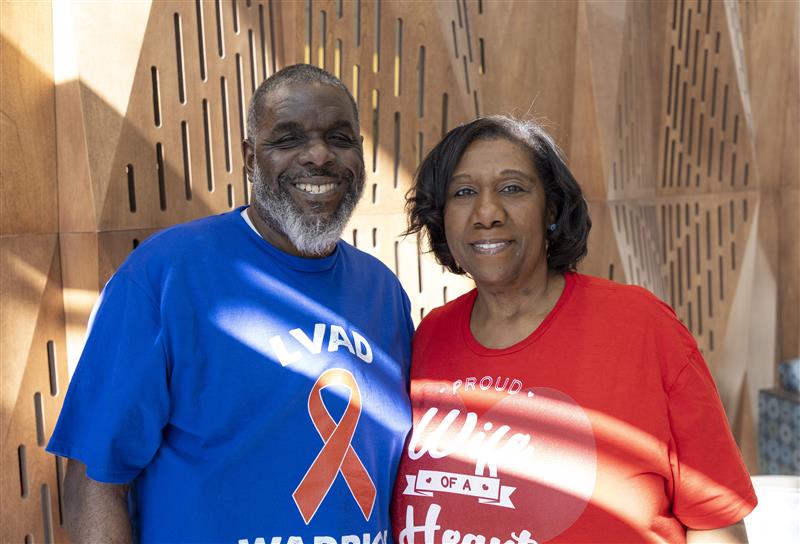LVAD Saved His Life: Meet LaDonis Patton

“I was terrified—I didn’t know what to expect,” said TriHealth heart patient LaDonis Patton about how he felt when he began his five-week stay at Bethesda North Hospital.
“I was coughing a lot, retained a lot of fluid, I couldn’t walk more than half a football field without taking a breath when I was referred to Dr. Kesari,” LaDonis said. “As soon as he seen me, he told me I had a whole bunch of fluid on me, which I did.”
That’s when LaDonis’ stay at Bethesda North began. During this stay, his care team would drain almost 40 pounds of fluid from his body, particularly his legs and neck.
Despite the fluid being drained, LaDonis was still dealing with complications.
“His heart was basically shutting down, so they suggested the LVAD,” said Africa, LaDonis’ wife.
“The LVAD, or Left Ventricular Assistant Device, is a mechanical pump that is placed surgically in the patient’s heart to support their native heart function,” described TriHealth Surgical Director of the LVAD Program Dr. Kathryn O’Keefe. “Your heart is still doing some amount of pumping and function, the LVAD is there to augment and improve that.”
The improved circulation from the LVAD would also help other issues that were beginning to develop as a result of LaDonis’ heart struggling without it, including kidney function. His were starting to fail.
“We had to make a decision right then and there, it’s not like he could go home and we could talk it over,” Africa said about deliberating over installing the LVAD. “They were saying that it’s either that or Hospice.”
After deciding to go full steam ahead on the LVAD, things took a positive turn as LaDonis’ surgery was a success.
“The staff at Bethesda North was wonderful. Dr. Kesari and O’Keefe’s team, from the doctors to the ICU, was absolutely wonderful,” Africa said. “They took care of him, they even took care of me at the same time.”
Now that he has had some time to recover, LaDonis will sometimes look back at the journey he’s been on and realize just how incredible it is.
“I was nervous, I didn’t know what to expect—I didn’t know how I was going to do it,” he said. “But they had a psychiatrist come in and talk to me, calm me down, and it wasn’t as bad as I thought it was going to be.”
With the help of Africa, LaDonis is adjusting to his new normal.
“He was getting his energy level back,” she laughed about her husband following the implant. “Even now, I can’t keep up with him—I have to keep my tracker on him just to see where he’s at.”
Thanks to his family, LaDonis keeps a positive attitude about his situation.
“This is my journey and this is what I gotta do, so this is what I’m gonna do,” he said proudly with a big smile on his face.
The Patton’s have even found time and energy to help others in similar situations learn more about the LVAD by working in support groups since LaDonis’ successful implant.
“LaDonis and Africa have been very generous with their time,” said Dr. Sateesh Kesari, TriHealth Medical Director of the Advanced Heart Failure Program. “They are on-call to speak to any of our patients who are potentially thinking about getting an LVAD.
“I’m looking forward to just living life,” LaDonis says of his newfound situation. “I feel like I got a second chance, and I’m going to take advantage of it.”
The TriHealth Heart & Vascular Institute focuses on personalized care - providing the least invasive option, with the least recovery time and optimal outcomes for each patient. Our highly regarded cardiologists and surgeons perform Cincinnati’s widest range of cardiac procedures at multiple locations across the region. Learn more here.
Related Articles
- Community & News
- Service Line
- Community & News
- Service Line